MUSICODE's M36 Review meeting was live on January
3 mos ago
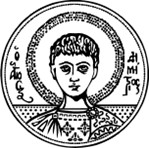
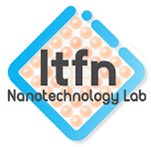
Aristotle University of Thessaloniki (AUTh) is the largest University in Greece. It consists of 45 Departments covering all scientific & technological disciplines with a total staff of around 9.000 people. The AUTh Research Committee provides administrative & financial support to EU and national funded R&D projects, technology transfer and royalty arrangements. The MUSICODE activities will be performed by the Nanotechnology Lab LTFN (www.ltfn.gr), which is established in the Physics Department of AUTh. LTFN is internationally acknowledged as a pioneer in Organic Electronics (OPVs, OLEDs, OTFTs, biosensors, etc), Plasmonics, Nanomedicine & Nanobiotechnology, Thin Film Technology & Nanoengineering, Real-time/In-line Optical Technology and Nanometrology, real-time/in-line precision Metrology, Computational & Modelling at nano to microscale, Automation and Digital Manufacturing.
Definition of specifications and requirements for OLAE nanomaterials and devices. Selection of specific nanomaterials and device architectures (OPVs, OLEDs) that will be fabricated by R2R printing and OVPD processes. Fabrication of OLAE nanomaterials in the form of blends combining novel organic semiconductors (donors, acceptors) and luminescent nanolayers for OPVs and OLEDs, respectively. R2R printing and OVPD Pilot to Production lines and integration/adaptation of metrology tools. Development of methodologies for in-line optical measurements, data processing routes and modelling for OE nanomaterials (organic semiconductors, transparent electrodes, polymer blends, nanoparticles etc.) with the existing in-line optical metrology platform (SE, RS, PL). Development of characterization protocols for printed nanomaterials and nanolayers. Multiscale characterization of OE nanolayers and devices by state-of-the-art analytical techniques. Analysis and modelling of optical properties of OPV and OLED nanomaterials. Dissemination and exploitationa activities of the project results. Connection of the MUSICODE project with the academic, research and industrial communities, through its huge ecosystems. Communication & interaction with other EU Projects. Connection to Industrial Communities. Dissemination and exploitation activities.
 Prof. S. Logothetidis (M)
Prof. S. Logothetidis (M)
Physicist, Material Science and Engineering, Thin Film & Nanomaterials Technology, Optics, Nanotechnology & Nanometrology. He has extensive R&D&I experience and conducted as a Co-coordinator and Project Leader in a more than 100 EU and National funded industrial R&D projects (Horizon, STREP, NMP-3, Growth, BRITE, ESPRIT, CRAFT, TMR, etc.)
He is the Founder and Director of LTFN (http://www.ltfn.gr) and of the Post-Graduate Program “Nanosciences & Nanotechnologies” (http://nn.physics.auth.gr) of AUTh. He is the Founder and Coordinator of the Innovation Research Network NANONET (http://www.nano-net.gr/) with more than 600 organizations (universities, research centers and companies) worldwide, Founder and President of HOPE-A (www.hope-a.com) with 40 members companies and 1000 collaboration entities worldwide, author/editor of 6 Books (e.g., “Handbook of Flexible Organic Electronics”, 2014, Woodhead Publishing), “Nanostructured Materials and Their Applications”, 2012 Springer), and 6 Patents, and the supervisor of more than 30 PhD,. 120 MSc Thesis Students and 35 Post-Doctoral Researchers. Prof. S. Logothetidis has extensive R&D&I experience through collaborations with 100 international research entities (Universities, Research Centers, Companies, etc) and he the advisor of several companies, government and institutions.
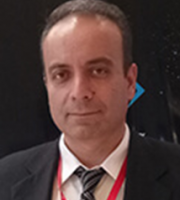 Assist. Prof. Argiris Laskarakis (M)
Assist. Prof. Argiris Laskarakis (M)
Physicist, MSc. in Material Science. PhD in Physics. Specialist in the fabrication of flexible organic electronics nanomaterials (organic semiconductors, transparent electrodes, barriers for encapsulation, flexible substrates) and devices (e.g. organic photovoltaics, organic thin film transistors) by vacuum and printing methods. In addition, he is expert in optical metrology of inorganic, organic and hybrid nanostructured materials by IR-Vis-fUV Spectroscopic Ellipsometry, and Raman Spectroscopy as well as on the computational modelling of optical properties of inorganic-organic-hybrid thin films.
 Mr. Christos Kapnopoulos (M)
Mr. Christos Kapnopoulos (M)
Physicist, MSc. in Material Science. PhD in Physics. Specialist in the fabrication of flexible organic electronics nanomaterials (organic semiconductors, transparent electrodes, barriers for encapsulation, flexible substrates) and devices (e.g. organic photovoltaics, organic thin film transistors) by vacuum and printing methods. In addition, he is expert in optical metrology of inorganic, organic and hybrid nanostructured materials by IR-Vis-fUV Spectroscopic Ellipsometry, and Raman Spectroscopy as well as on the computational modelling of optical properties of inorganic-organic-hybrid thin films.
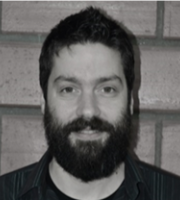 Mr. Alexandros Zachariadis (M)
Mr. Alexandros Zachariadis (M)
Physicist, MSc. in Nanosciences & Nanotechnologies. Specialist in In-Situ, In-Line and Real-Time optical spectroscopic techniques (Ellipsometry, Raman, Photoluminescence) and in the investigation and monitoring of optical properties, morphology, thickness, composition, growth mechanisms, and bonding structure of nanomaterials deposited by wet or vacuum techniques. He is also experienced in the modelling of the optical properties of organic and inorganic nanostructured materials (organic semiconductors, graphene, perovskites, polymers, small molecules) and in the optics of thin film Photovoltaic devices.
 Ms. Alexandra Stamateri (F)
Ms. Alexandra Stamateri (F)
Physicist, MSc. in Nanosciences & Nanotechnologies. Specialist in In-Situ, In-Line and Real-Time optical spectroscopic techniques (Ellipsometry, Raman, Photoluminescence) and in the investigation and monitoring of optical properties, morphology, thickness, composition, growth mechanisms, and bonding structure of nanomaterials deposited by wet or vacuum techniques. He is also experienced in the modelling of the optical properties of organic and inorganic nanostructured materials (organic semiconductors, graphene, perovskites, polymers, small molecules) and in the optics of thin film Photovoltaic devices.
 Mr. Michalis Chatzidis (M)
Mr. Michalis Chatzidis (M)
Dipl. Electrical & Computer Engineer, MSc in Nanosciences & Nanotechnologies. He is leading on CVD (Chemical Vapour Deposition) and OVPD (Gas Transport Techniques) group for Organic Electronic Devices development in nanoscale. Research field: Remote & Virtual Experiments Platform for educational purpose with SPM techniques studies. Topographic & Electrical Characterization of organic thin films by SPM techniques (AFM, STM). Roll-to-roll Printing of Active and Passive layers for Organic Electronics (e.g. OPVs, OLEDs). Specialist on Vacuum Systems & Gas Transport Techniques Pilot Lines (OVPD, CVD) on development of OE devices (OPVs, OLEDs, OTFTs).
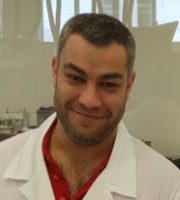 Mr. Giorgos Nomikos (M)
Mr. Giorgos Nomikos (M)
Dipl. Electrical Engineering & Computer Science, MSc in Nanosciences & Nanotechnologies. Specialist in handling on Vacuum Systems: a) development of small molecules Organic Solar Cells (OSCs) by Vacuum Thermal Evaporation (VTE) & Organic Vapor Phase Deposition (OVPD) techniques, b) Fabrication of Organic Thin Film Transistors (OTFTs), Organic Light Emitted Diodes (OLEDs) and finally characterization of their properties. His Profession is Process and Service Engineer supporting the Laboratory of Thin Films & Nanometrology (LTFN) as Senior Researcher in various processes and activities. Finally, he is field coming to combine Process Techniques (Gas Transport, S2S under atmosphere or N2 environment) and Testing Characterization (Electrical, Mechanical Characterization) methods.